Posts Tagged ‘Internally Displaced People’ (52 found)
Myanmar: UN Warns Hundreds of Thousands Affected by Aid Disruption in Rakhine State
2 April 2014 – The United Nations humanitarian wing is warning that life-saving assistance to hundreds of thousands of vulnerable people in Myanmar’s Rakhine state have been seriously disrupted following the recent attacks on the UN and non-governmental organizations (NGOs)[…]
• • •Marching to Genocide in Burma – New Report by United To End Genocide
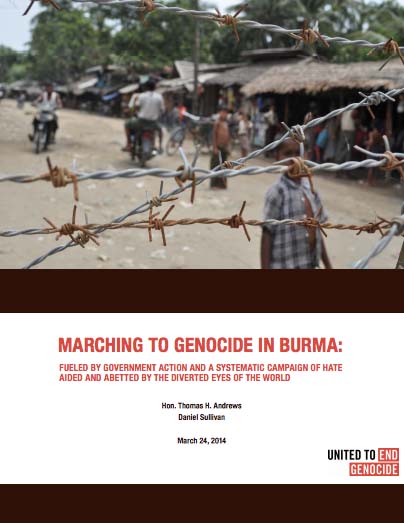 United to End Genocide completed a four week fact-finding mission to Burma on March 16, 2014. What we discovered was alarming. Nowhere in the world are there more known precursors to genocide than in Burma today. Hundreds have been killed with a death toll mounting daily, tens of thousands have fled under the most hazardous conditions, and 140,000 have been forced into horrible, overcrowded camps where they face severe restrictions and are denied basic necessities including medical care[…]
United to End Genocide completed a four week fact-finding mission to Burma on March 16, 2014. What we discovered was alarming. Nowhere in the world are there more known precursors to genocide than in Burma today. Hundreds have been killed with a death toll mounting daily, tens of thousands have fled under the most hazardous conditions, and 140,000 have been forced into horrible, overcrowded camps where they face severe restrictions and are denied basic necessities including medical care[…]
Karen Worldwide Call for Burma’s Census to be Postponed
28 Karen community organisations from 11 countries are writing to the United Nations Population Fund and their respective governments, expressing deep concern over Burma’s upcoming census, and calling for it to be postponed […]
• • •Brang Yung and Lahpai Gam Prison Sentences Increased
On Thursday 19th December two Kachin civilians, Brang Yung and Lahpai Gam, had their sentences increased from 2 to 7 years in jail. They were already serving 2 year prison sentences after a verdict last month. It is not yet clear why their sentences were increased. Although Thein Sein promised to release all political prisoners by the end of this year, farmers, activists and ethnic civilians are continuing to be arrested, and put on trial […]
• • •Poverty, Displacement and Local Governance in South East Burma/Myanmar
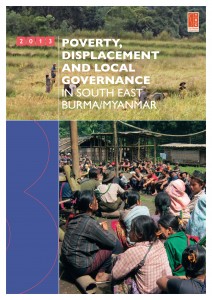 As the pace of reform has slowed in Burma/Myanmar during 2013, the potential for an inclusive political dialogue process to address the causes of conflict has increased. The sustainability of national reconciliation will require sensitivity to the concerns and aspirations of ethnic nationality communities in relation to identity, security and justice. This village-level survey describes the challenge of addressing chronic poverty, protracted displacement and weak governance at the community level in South East Myanmar as part of the conflict transformation process […]
As the pace of reform has slowed in Burma/Myanmar during 2013, the potential for an inclusive political dialogue process to address the causes of conflict has increased. The sustainability of national reconciliation will require sensitivity to the concerns and aspirations of ethnic nationality communities in relation to identity, security and justice. This village-level survey describes the challenge of addressing chronic poverty, protracted displacement and weak governance at the community level in South East Myanmar as part of the conflict transformation process […]
Myanmar Peace Process Must Address Protection Concerns: NGO Report
Village Survey in Myanmar identifies challenges for poverty alleviation, displaced persons and local governance
The Border Consortium (TBC), an NGO that works with the displaced and conflict-affected people of Myanmar, today released findings from its annual survey which describe chronic poverty, protracted displacement and weak governance as the starting point for conflict transformation. Eleven civil society organisations in South East Myanmar collaborated with TBC to conduct the survey in 209 villages spread across 6 states and regions […]
• • •Burma Risk Assessment
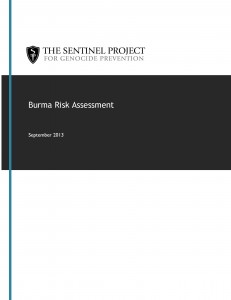 Following extensive research, the Sentinel Project has concluded that the risk of genocide or related mass atrocities in Burma is extremely high. Despite recent democratic reforms in the country, violence, discrimination, and extrajudicial killings continue and are mostly directed toward the Muslim Rohingya minority in Rakhine state. Violence and other crimes against the Rohingya, which are conducted by both state and non-state groups, are both widespread and systematic […]
Following extensive research, the Sentinel Project has concluded that the risk of genocide or related mass atrocities in Burma is extremely high. Despite recent democratic reforms in the country, violence, discrimination, and extrajudicial killings continue and are mostly directed toward the Muslim Rohingya minority in Rakhine state. Violence and other crimes against the Rohingya, which are conducted by both state and non-state groups, are both widespread and systematic […]
Arm Conflict in Kutkai Township Creates More Internal Displacement
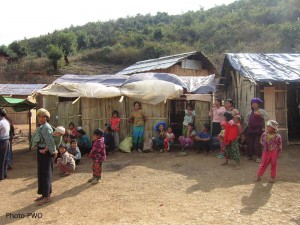 On 18th June 2013, in Kutkai Township, Northern Shan state, there was a conflict between the TNLA Battalion (112) and the Burmese military Infantry Battalion (IB) 145 which resulted in over one hundred villagers fleeing their homes […]
On 18th June 2013, in Kutkai Township, Northern Shan state, there was a conflict between the TNLA Battalion (112) and the Burmese military Infantry Battalion (IB) 145 which resulted in over one hundred villagers fleeing their homes […]
Bridging the Housing Land and Property Gap
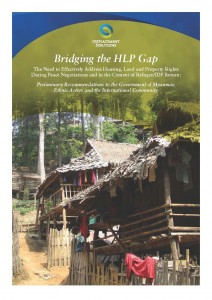 Of the many challenging issues that will require resolution within the peace processes currently underway between the government of Myanmar and various ethnic groups in the country, few will be as complex, sensitive and yet vital than the issues comprising housing, land and property (HLP) rights. Viewed in terms of the rights of the sizable internally displaced person (IDP) and refugee populations who will be affected by the eventual peace agreements, and within the broader political reform process, HLP rights will need to form a key part of all of the ongoing moves to secure a sustainable peace, and be a key ingredient within all activities dedicated to ending displacement in Myanmar today […]
Of the many challenging issues that will require resolution within the peace processes currently underway between the government of Myanmar and various ethnic groups in the country, few will be as complex, sensitive and yet vital than the issues comprising housing, land and property (HLP) rights. Viewed in terms of the rights of the sizable internally displaced person (IDP) and refugee populations who will be affected by the eventual peace agreements, and within the broader political reform process, HLP rights will need to form a key part of all of the ongoing moves to secure a sustainable peace, and be a key ingredient within all activities dedicated to ending displacement in Myanmar today […]
Protecting Minority Rights Is Non-Negotiable
In its rush to normalize relations with Myanmar, the international community – particularly the United Nations – must not ignore the increase in abuses being committed against ethnic minorities in Rakhine and Kachin States, and it must take a stronger stance in defense of the human rights of affected populations. Ten months after violence forced them into displacement […]
• • •








 All posts
All posts